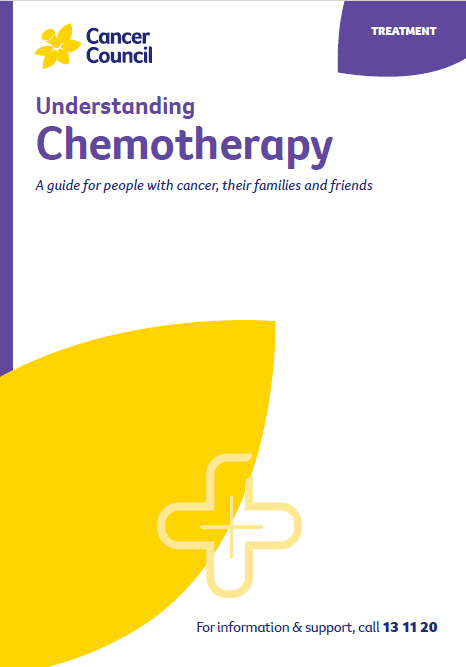- Home
- Ovarian cancer
- Treatment
- Chemotherapy
Chemotherapy for ovarian cancer
Chemotherapy is the treatment of cancer with anti-cancer (cytotoxic) drugs. The aim is to destroy cancer cells while causing the least possible damage to normal, healthy cells.
Learn more about:
- When is chemotherapy used?
- Having chemotherapy
- Intraperitoneal chemotherapy
- Blood tests during chemotherapy
- Side effects of chemotherapy
- Video: What is chemotherapy?
When is chemotherapy used?
When you have chemotherapy depends on the stage of the cancer. It may be used at different times:
Before surgery
For stage 3 or 4 ovarian cancer, chemotherapy is sometimes given before surgery. This is known as neoadjuvant chemotherapy. The aim is to shrink the tumours to make them easier to remove.
After 3–4 cycles of chemotherapy, you will have a CT scan to check how the tumour has responded to the chemotherapy. Your doctor or multidisciplinary team will then decide whether to recommend an operation. If you have surgery, you will have another 2–3 cycles of chemotherapy afterwards. If you do not have surgery, you will continue with a further 3 cycles of chemotherapy.
After surgery
Chemotherapy is usually given 2–4 weeks after the surgery (adjuvant chemotherapy) as there may be some cancer cells still in the body. For ovarian cancer, the drugs are usually given in repeating cycles spread over 4–5 months, but this can vary depending on the stage of the cancer and your general health. Your treatment team will talk to you about your specific schedule. Some people may have chemotherapy and a targeted therapy drug.
Main treatment
Chemotherapy may be recommended as the main treatment if you are not well enough for a major operation or when the cancer cannot be surgically removed.
Having chemotherapy
Chemotherapy is usually given as a combination of 2 or more drugs, or sometimes as a single drug.
In most cases, the drugs are injected into a vein (intravenously). To reduce the need for repeated needles, you may receive chemotherapy through a small medical appliance or tube inserted beneath your skin. This may be called a port-a-cath or a peripherally inserted central catheter (PICC), or it may have another name.
You will usually have chemotherapy as an outpatient (also called a day patient), but some people need to stay in hospital overnight.
For more on this, see our general section on Chemotherapy.
Chemotherapy is commonly given as a period of treatment followed by a break. This is called a cycle. The break between the cycles lets your normal cells recover and your body regain its strength.
Intraperitoneal chemotherapy
Occasionally, chemotherapy is given directly into the abdominal cavity (the space between organs in the abdomen and the walls of the abdomen). This is known as intraperitoneal chemotherapy.
In this method, the drugs are delivered through a tube (catheter) that is put in place during surgery and removed once the course of chemotherapy is over.
Intraperitoneal chemotherapy is used only in specialised units in Australia. It may be offered for stage 3 cancer with less than 1 cm of tumour remaining after surgery. Some studies have shown it may be more effective than giving chemotherapy through an intravenous drip.
There are other studies looking at giving heated intraperitoneal chemotherapy (HIPEC) at the time of surgery.
Ask your medical oncologist for more information about this type of chemotherapy, its benefits and risks, and if it is suitable for you.
Blood tests during chemotherapy
You will have blood tests before each chemotherapy cycle, to check that your body’s healthy cells have had time to recover. If your blood count has not recovered, which can be common, there may be a delay before your next treatment.
If you had raised CA125 levels when you were diagnosed, you may also have blood tests during treatment to check what is happening to these levels.
The blood tests will check if:
- CA125 levels fall during treatment – this can mean the chemotherapy is destroying the cancer cells
- CA125 levels stay the same or rise during treatment – this may mean the cancer is not responding to chemotherapy.
→ READ MORE: Side effects of chemotherapy
Video: What is chemotherapy?
Watch this short video to learn more about chemotherapy.
Podcast: Making Treatment Decisions
Listen to more episodes from our podcast for people affected by cancer
Dr Antonia Jones, Gynaecological Oncologist, The Royal Women’s Hospital and Mercy Hospital for Women, VIC; Dr George Au-Yeung, Medical Oncologist, Peter MacCallum Centre, VIC; Dr David Chang, Radiation Oncologist, Peter MacCallum Cancer Centre, VIC; Prof Anna DeFazio AM, Sydney West Chair of Translational Cancer Research, The University of Sydney, Director, Centre for Cancer Research, The Westmead Institute for Medical Research and Director, Sydney Cancer Partners, NSW; Ian Dennis. Consumer (Carer); A/Prof Simon Hyde, Head of Gynaecological Oncology, Mercy Hospital for Women, VIC; Carmel McCarthy, Consumer; Quintina Reyes, Clinical Nurse Consultant – Gynaecological Oncology, Westmead Hospital, NSW; Deb Roffe, 13 11 20 Consultant, Cancer Council SA.
View the Cancer Council NSW editorial policy.
View all publications or call 13 11 20 for free printed copies.
